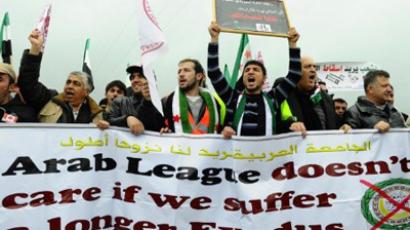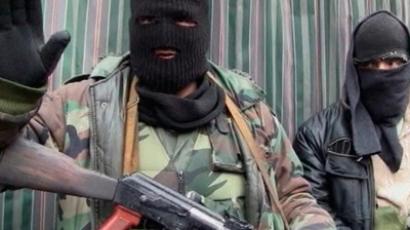Humanitarian corridors in Syria: Way out of crisis or way in for invaders?
Europe seeks to bring relief to the Syrian people by creating humanitarian corridors, a seemingly noble idea aimed at winning Russian and Chinese support in the UN Security Council. But some are calling the plan a wolf in sheep’s clothing.
The call for supply routes bringing humanitarian aid to Syrian cities first surfaced last November, and is back on the table as of this week.“The idea of humanitarian corridors that I previously proposed, which would allow NGOs to reach the zones where scandalous massacres are taking place, should be discussed at the Security Council,” French Foreign Minister Alain Juppe said Wednesday.Paris suggested creating a safe passage for relief organizations, either with Syrian approval or under an international mandate – hence the need for UNSC approval. Damascus is currently stretched thin on forces, and hardly has any to spare on guarding aid convoys. But allowing foreign troops on its territory is also not an option, as was shown in the recent refusal to allow entry to Arab League peacekeepers.The Security Council could establish the corridors through a resolution, and mandate that they be guarded by some government or organization. But Russia and China, who both have veto power, said they will not allow passage of any resolution they see as unbalanced.Both Russia and China oppose any UN resolution that could later be used by NATO as permission for military action, as happened in Libya. “Libya offers a negative case study. NATO abused the Security Council resolution about establishing a no-fly zone and directly provided firepower assistance to one side in the Libyan war," said China’s biggest Communist newspaper, The People's Daily.Juppe’s plan so far has only received backing from the European parliament. Its President, Martin Schulz, said the body “wants to see humanitarian corridors to be put into place and shelters provided for the growing numbers of displaced people.”Not everyone seems to be sold on the idea, however. NATO would be the first choice for guarding duty, but its Secretary-General Anders Fogh Rasmussen stated the alliance has “ no intention whatsoever to intervene in Syria." He also reiterated that “a regional solution” should be found for the conflict. This passes the ball to the Arab League, though Syria’s lack of trust in some League members like Qatar and Saudi Arabia could get in the way. Damascus suspects the two Sunni monarchies of fueling the unrest in Syria in a bid to oust the Shia Alawite minority from power, so Syrian acceptance of their troops on its soil is unlikely.And Lebanon and Turkey, the two countries that could easily deliver aid into Syrian territory, aren’t in a hurry to do so. Turkish press recently reported that Ankara would prefer an aid corridor going through the Mediterranean Sea and supported by the British military base in Cyprus, rather than through Turkey’s southeastern territories. Turkey’s reluctance to act directly against Syria is understandable. Joining the international choir calling on President Assad to step down and suggesting an internationally protected zone for the Syrian opposition on its territory is one thing. Invading its neighbor and facing possible military retaliation from Syria – and perhaps its close ally Iran as well – is a bit too risky, even for a NATO member. Especially if retribution may come indirectly – through support of Kurd separatists waging a guerrilla war on Turkish troops.
Secret war already being waged inside Syria?
Asia Times' roving correspondent Pepe Escobar told RT that installing a humanitarian corridor is akin to telling a government "Look, you are illegitimate and incompetent – now we would like to take care of your people."“And on the ground of this corridor there will be all kinds of things happening like weapons smuggling, intelligence operatives penetrating and coordinating with local people,” he added. Escobar also noted that the Gulf Cooperation Council (GCC) countries are basically the only ones pushing for the humanitarian corridor.“The ones that are really involved are Saudi Arabia and Qatar. They are selling this idea to the US, Britain and France.”The journalist also said there will not actually be a humanitarian corridor, but just a pretext to be on the ground and to influence action inside Syria much more than is currently possible. But in addition to any questions raised by the proposed humanitarian corridors, Escobar said a secret war is already being waged against Syria.“There is already a foreign military intervention going on. Do not forget that NATO have a command and control center in Hatay province, Southern Turkey, very close to the Turkish-Syrian border. This is a conduit for intelligence going back and forth across borders, and weapons, of course – and these weapons are being financed basically by the GCC, especially the Saudis and the Qataris actively involved – with the intelligence as well as with monitors and trainers on the ground.”He added that there is another conduit through the Lebanese border – the Syrian National Council. “They are supported directly by Nicolas Sarkozy and David Cameron, by the Turkish government and the Qataris. And there is also the Free Syrian Army – which even non-biased analysts in Europe say is not free and is not an army: it’s a bunch of guerrillas infiltrated by people affiliated with Al-Qaeda and Salafi Jihadists.”Escobar concluded that humanitarian corridors or not, the foreign interference is already there. “Now this is a shadow war doubled with a civil war,” he said.Earlier there had been speculation that Syrian rebels had been trained by US and NATO forces in southern Turkey. According to former FBI translator Sibel Edmonds speaking to Turkey’s Daily Milliyet newspaper, the US had been involved in smuggling weapons across the Turkish border from the Incirlik military base. Qatar and Saudi Arabia have also reportedly offered financial support to the Syrian opposition by offering to help them replenish their dwindling weapons supply. There have also been reports of British and Qatari troops directing rebel ammunition deliveries and tactics in the bloody battle for Homs.And according to NBC News, the US has “a good number” of drones flying regularly over Syrian territory and presumably collecting evidence of atrocities. The monitoring of Government troop movements has its merits as military intelligence, and can be used for contingency planning by the Pentagon or as a bit of friendly help for the opposition forces.














